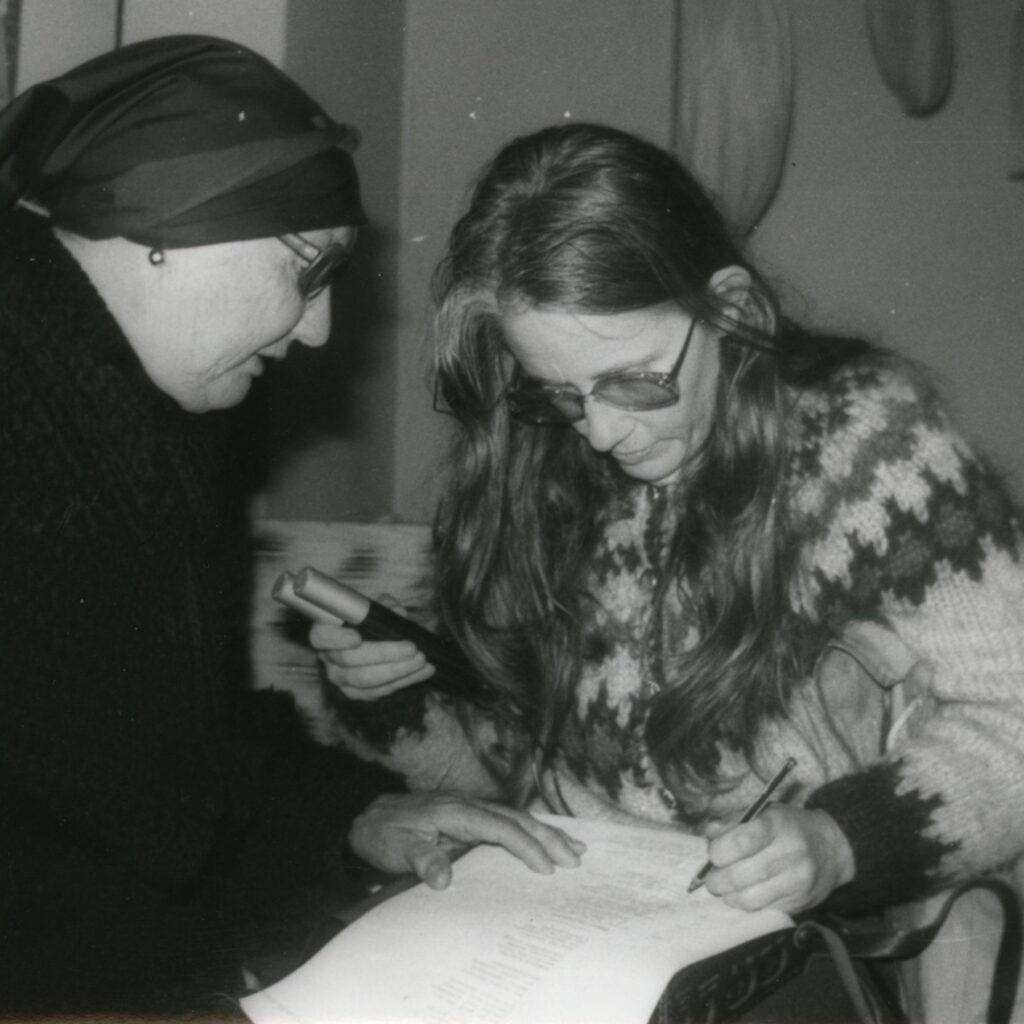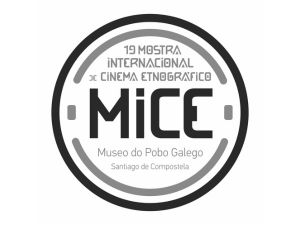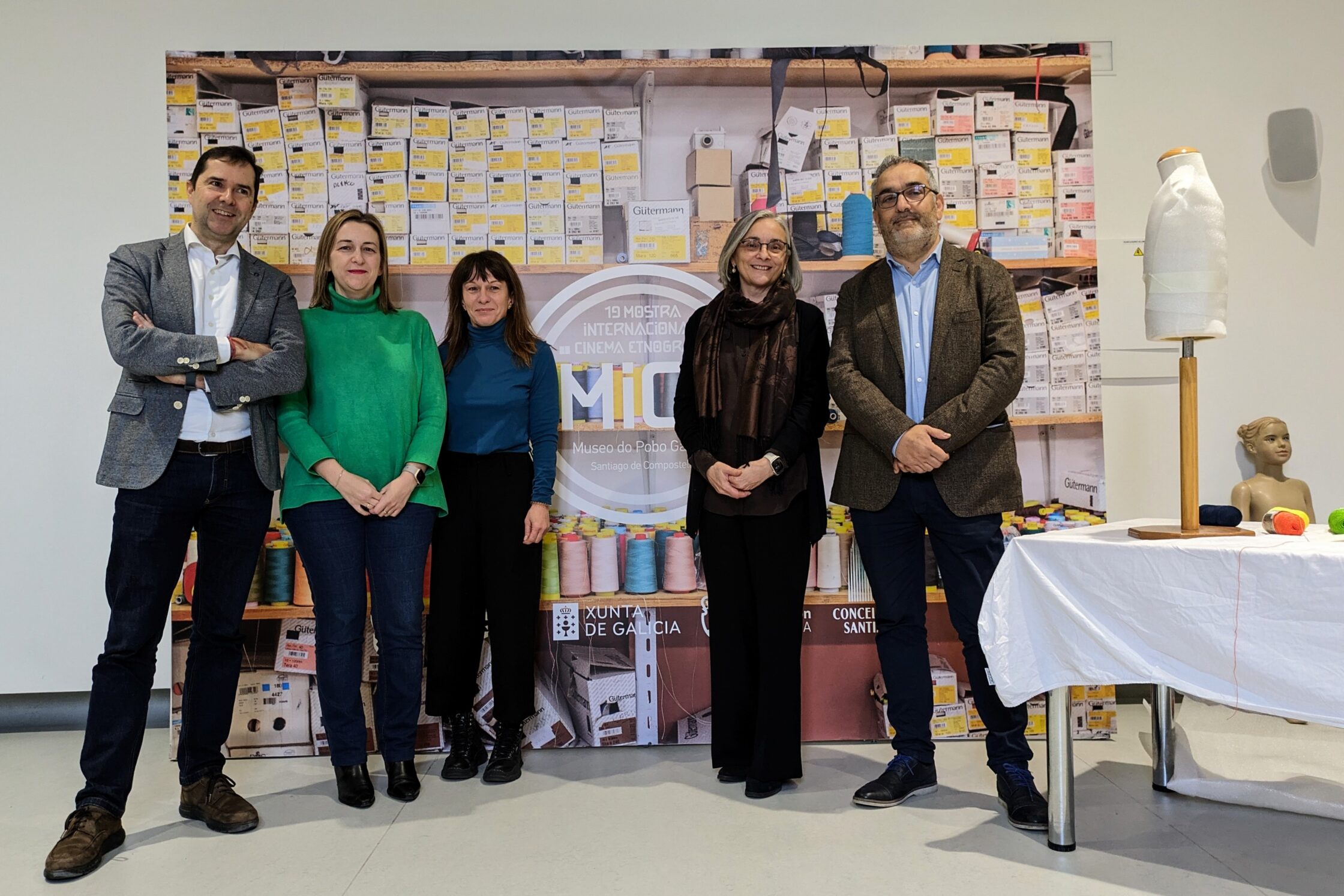March 6th 2023.- Once again this year, the International Ethnographic Film Festival by Museum of Galician People is highlighting the work of female directors and producers who focus on this type of specialised cinema. At the MICE, which will inaugurate the annual session of Galician film festivals in Compostela from March 20th to 26th, nearly 70 films from more than a dozen nationalities will be screened. In the official section 13 films will be competing, and 8 of them are directed by women.
The programme official presentation of this 19th edition took place this morning, with the presence of the MICE director, Ana Estévez Lavandeira; the president of the of Museum of Galician People Board of Trustees, Concha Losada; the author of the image and the signature piece of the 19th MICE, Sabela Souto; the city councillor responsible for the Culture Capital of Santiago de Compostela, Míriam Louzao Fernández; the county council member of A Coruña, Xosé Luis Penas Corral; and the director of the Galician Agency for the Cultural Industries—Agadic—, Jacobo Sutil.
Signature piece
The programme brings together an ethnographic cinema vision focusing on politics, and the piece that accompanies this 19th MICE and the graphic image from it have a female authorship. The filmmaker from Verín Sabela Souto is the creator of an audiovisual piece based on a previous work on the first textile cooperative in the region of Verín, in which labour politics, feminism, and tradition converge in the industrial memory of women.
586 cantos, a tribute to Dorothé Schubarth
Another woman will also be the protagonist in the MICE opening session. On Wednesday, March 20th, at 8pm, the Teatro Principal will host the premiere of 586 cantos. The project, promoted by the Festival, will be a tribute to the Swiss ethnomusicologist Dorothé Schubarth’s legacy, who passed away in 2023, and to her audiovisual anthropology work, MICE’s raison d’être. The starting point is the archive material stored in the Archive of the Oral Heritage of the Identity (APOI) of the Museum of Galician People, with the sound recording, photographs, text transcriptions and scores from the fieldwork carried out in Galicia between 1979 and 19984 by Schubarth, in collaboration with Antón Santamarina, which were the basis of the Popular Galician Songbook. On the musical level, the staging at Teatro Principal will feature the work of Richi Casás, who built his artistic career on the recordings Dorothé Schubarth gathered at her grandmother Rosa’s house. Based on this heritage, the saxophonist created an original proposal in which tambourines, jazz and Latin rhythms converge. Fran Barcia, Tania Caamaño, Antía Ameixeiras and him will be in charge of a musical performance that will be live-synchronised with the visual staging Laura Piñeiro and Fran Rodríguez Casal—filmmakers who are members of the Memory and Cinema Association—will create for the MICE.

Retrospective on the pioneer of Italian documentary cinema
The Cecilia Mangini focus by Carolina Astudillo will be one of the highlights of a festival that turns the Galician capital into the setting for one of the very few international events specialising in films which address what we are collectively, the human culture and society. The Chilean filmmaker will relate the considered “Italian Agnès Varda“’s work to her own filmography in a total of three sessions that will also include the premiere of Astudillo’s latest film, Postal.
Official sections: International and Galicia
Thirteen films will aim for MICE Award for Best International Film, nine of them from several nationalities, and four films produced in Galicia also compete for MICE Award for Best Galician Film. Thus, we will attend the premiere of With Love, Stella, by Stela Roxana Pascal; the Spanish first releases of Flotacija, by Eluned Zoe Aiano and Alesandra Tatić; Riada, by Carlos Tobón; 西昆 (Life and Death in Xikun), by Jiandong Huang; and The Guardians of the Flame, by Daniel Wolff. We will also attend the Galician first releases of TaxiBol, by Flavio Armone; Onde fica esta rua?, by João Pedro Rodrigues and João Rui Guerra da Matao; El Signo Vacío, by Kathryn Ramey; Sew To Say, by Rakel Aguirre; and 12 de maio de 1937, by Mar Caldas. The official section also includes the films La Revolución (es) Probable, by María Ruido, Paula Barreiro-López and Lee Douglas; Habitar, by Anxos Fazáns; and Lavadoiro, by Ana Amado and Lois Patiño. All the films will aim for AGANTRO Award for Anthropologic Excellence, CREA Award, awarded by the Galician Association of Filmmaking and Directing Professionals; and Public Award. The awards ceremony will take place on Sunday, March 24th, at 12.30 pm at the Museum of Galician People.

The Spanish Transition to democracy and Galician cinema
Trazas section, developed in collaboration with Cineclube de Compostela and the Performing, Musical and Audiovisual Arts section of the Consello da Cultura Galega (Galician Culture Council), focuses on Spanish Transition to democracy and Galician cinema, as part of this 19th MICE thematic line. Coordinated by the producer Beli Martínez and the cinema historian José Manuel Sande, it will be held in three discussion sessions. The first one, focused on Amateur and militant cinema of the Transition, with the participation of Cabanas Cao, Antón Caeiro and Xan Gómez Viñas, moderated by Ana Domínguez; the second one, From amateur to professional, with Manolo Abad, Manolo Gonzalez and Milagros Bará, moderated by Marcos Gallego; and the third one on the Representation of the Transition in contemporary cinema, with Eloy Enciso, José Manuel Sande and Coral Piñeiro, moderated by Beli Martínez.
Also, Trazas programme includes three screening sessions, where Conxo, unha experiencia, by Manolo Abad; CCCV, by Ramiro Ledo Cordeiro; A lei da terra, by Colectivo Grupo Zero; a group of short films by Manoel Dacosta; the censored film Rocío, by Fernando Ruiz Vergara; and the short film 28F – Andalucía, by Nonio Parejo will be screened. These two former films will be presented and followed by a discussion with Alejandro Alvarado, filmmaker, teacher, researcher and author of the book La postcensura en el cine documental de la transición española (Post-censorship in documentary cinema of the Spanish transition).
Tickets, venues and parallel programme
In addition to the screenings, this 19th edition will feature training activities, with Lindes sessions given by filmmakers Diana Gonçalves and Iván Castiñeiras, and the workshop Audiovisual creation with easy-to-use devices, taught by Coral Piñeiro and Bruno Arias. Other two central themes of the 19th MICE will be the programme for schoolchildren and families, with the MICEscola and MICE Petís, and among the parallel activities, the exhibition Da túa man para a miña, by Fran Rodríguez Casal, and the screening of Os espazos en branco, by the very young filmmaker Bruno Arias stand out.
The entire MICE programme is free of charge, and it will take place at four venues in the city: the Museo do Pobo Galego, the Teatro Principal, the Salón Teatro and NUMAX. The guide and all the information on how to buy tickets can be checked on the festival website www.mice.museodopobo.gal/es/
MICE has the support of Santiago’s City Council, A Coruña’s Provincial Council Department for Culture, and AGADIC—the Galician Agency for the Cultural Industries (Xunta de Galicia)



